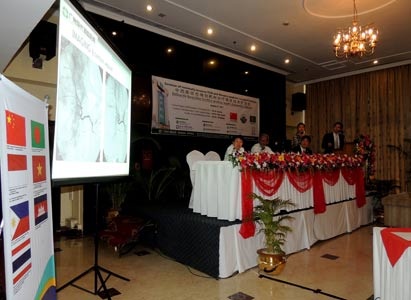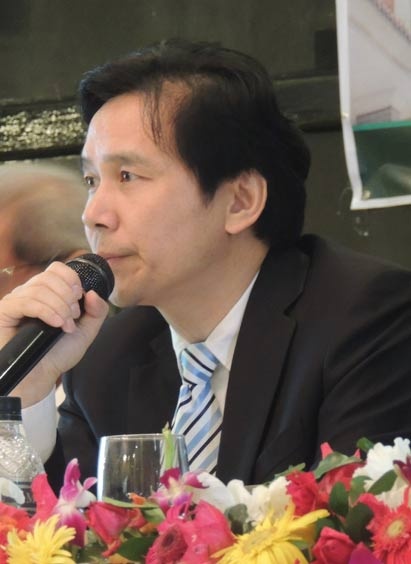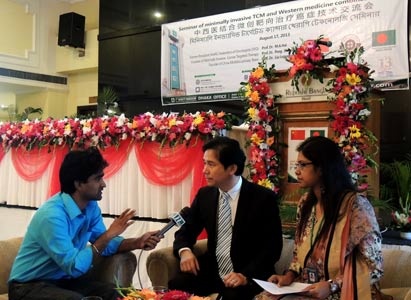Professor Peng Xiaochi, the founder of the anticancer treatment that combines TCM with minimally invasive targeted therapy, Liu Lvguang, the founder of China MDT Experts Panel Oncology Academic Committee, and Bangladesh leading oncologist Prof. Dr.M.A.Hai were invited by Dhaka office of Modern Cancer Hospital Guangzhou, China to attend a symposium on combined treatment of TCM &minimally invasive targeted therapy. Bangladesh Cancer Association professors and some Chinese living in Bangladesh also were invited.

Prof. Peng Xiaochi explaining cancer treatments
On August 17th 2013(Saturday), at the invitation of Dhaka office of Modern Cancer Hospital Guangzhou, Professor Peng Xiaochi, the founder of the anticancer treatment that combines TCM with minimally invasive targeted therapy in Modern Hospital Guangzhou belonging to Boai (China) Enterprise Group, Liu Lvguang, the founder of China MDT Experts Panel Oncology Academic Committee, and Bangladesh Cancer Association attended a symposium: New Hope of Cancer Treatment--Symposium on Combined Treatment of TCM &Minimally Invasive Targeted Therapy. The symposium was jointly sponsored by China Bangladesh Federation & Modern Hospital Guangzhou of Boai Group and supported by William Taya Medicine & Confucius Institute of North South University in Bangladesh. Dhaka office of Modern Cancer Hospital Guangzhou, International TV Bangladesh Santos Mariam Mary Broadcast Confucius Classroom and China MDT Experts Panel Bangladesh Committee jointly hosted the meeting. Bangladesh NTV had an exclusive interview with Prof. Peng Xiaochi. Chinese community China Bangladesh Federation offered six mobile phones as prizes of the lucky draw at the meeting.

Prof. Peng Xiaochi answering doctors' questions
On the symposium Bangladesh leading oncologist Prof. Dr.M.A.Hai first gave a speech. Afterwards, Liu Lvguang, the founder of China MDT Experts Panel Oncology Academic Committee explained the therapeutic effects of cryosurgery therapy on middle and late stage breast cancer in women. Finally, Professor Peng Xiaochi, the founder of the anticancer treatment that combines TCM with minimally invasive targeted therapy comprehensively explained successful clinical cases that used thirteen types of minimally invasive targeted therapy to treat cancer. Particularly, he pointed out that I125 seed implant and interventional chemoembolization have significant efficacy in treating liver cancer, lung cancer and prostate cancer. Members of Bangladesh Cancer Association also actively took part in the talk and exchange with the two oncologists from China and expressed their wish to send Bangladesh patients to China to receive treatments. The symposium specially invited Mr. Amirul Islam and Mr. Shihab Uddin, two patients who once had treatments in Modern Cancer Hospital Guangzhou. They told the participants in detail about their treatments in China. Meanwhile, they appreciated the care they received from the medical staff during their hospital stay in China and had great trust in minimally invasive targeted therapies treating cancer in China. Participants learned that cancer is treatable, controllable and preventable. Besides, if diagnosed early and then treated with minimally invasive targeted therapy, patients can live a longer life and may even never have recurrence. Participants then offered information on some patients’ present treatment condition hoped that arrangements could be made for these patients to receive treatments in China. Dhaka office of Modern Cancer Hospital then informed professors and guests attending the symposium that in the two days following the symposium the two oncologists from China would carry out free consultation in Bangladesh. Cancer patients can go to Dhaka office for free consultation.

Prof. Peng Xiaochi in an exclusive interview with Bangladesh NTV
*Surgery, in addition to the appropriate chemotherapy and radiotherapy, are effective in treating early cancer, but certain patients in late stage of cancer may not be tolerate surgery well as they can be relatively weak. A combination of carefully planned minimally invasive therapy, chemotherapy or radiotherapy can effectively reduce the side effects and discomfort of treatment and may help patient get better efficacy.













 viber
viber